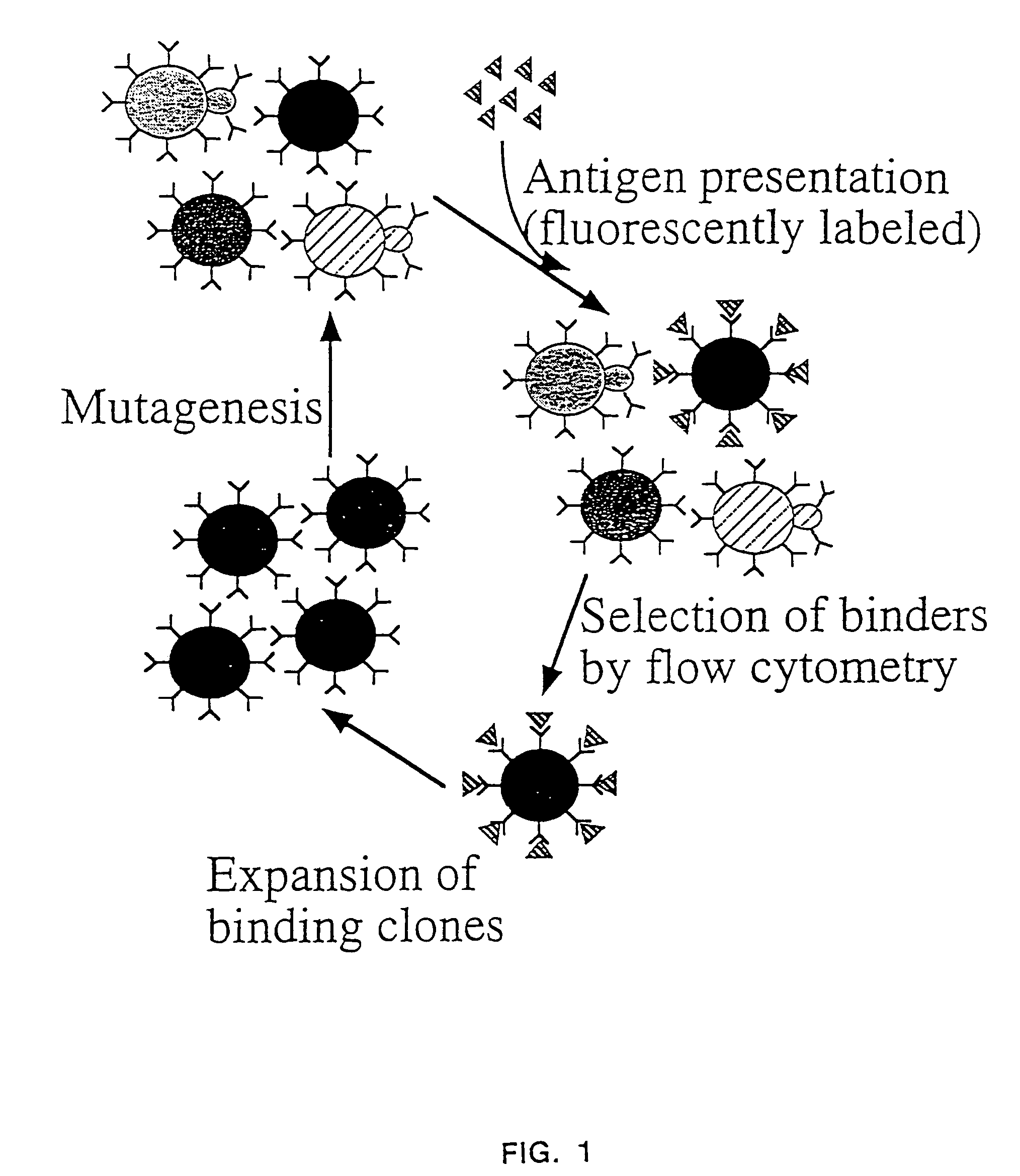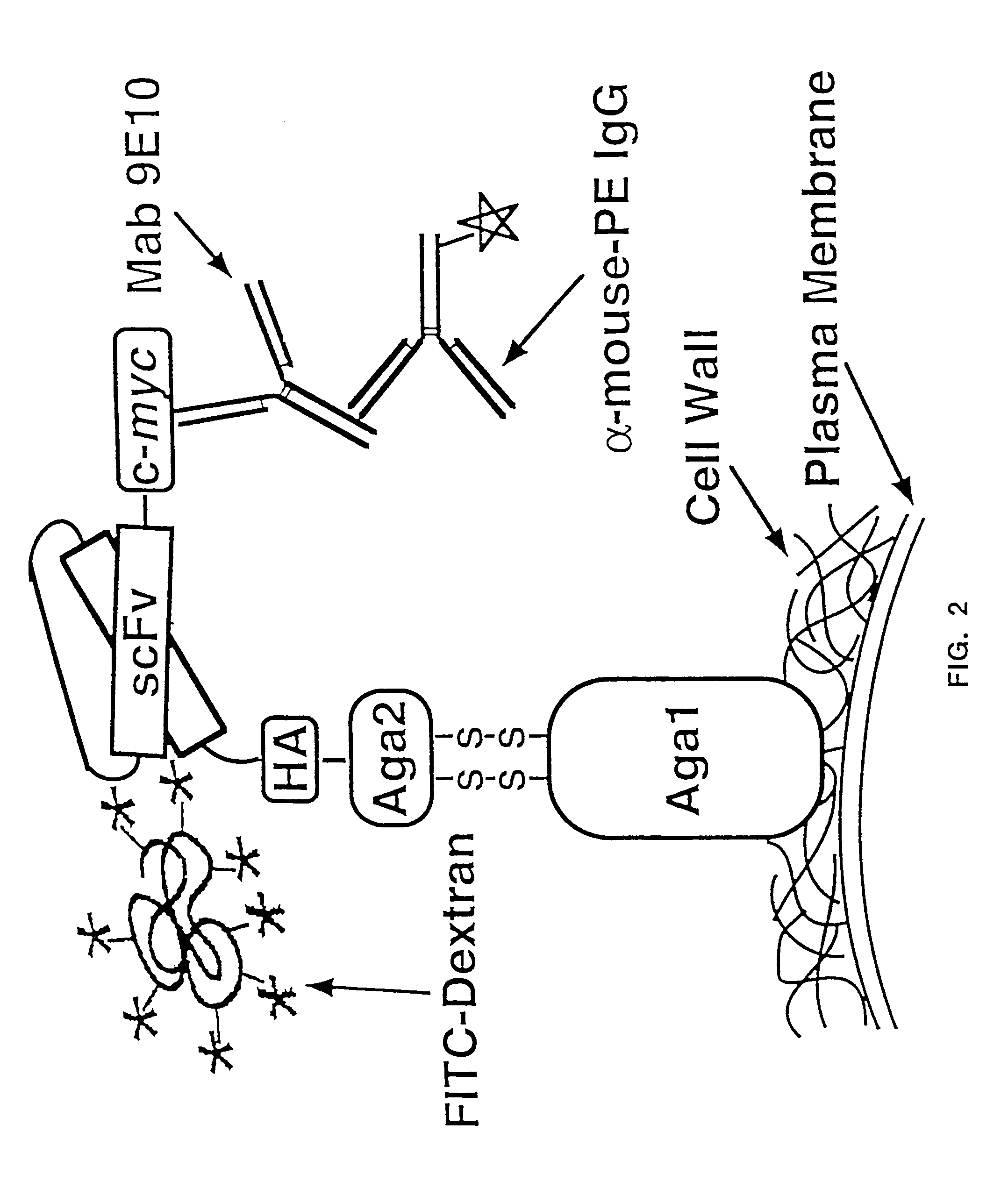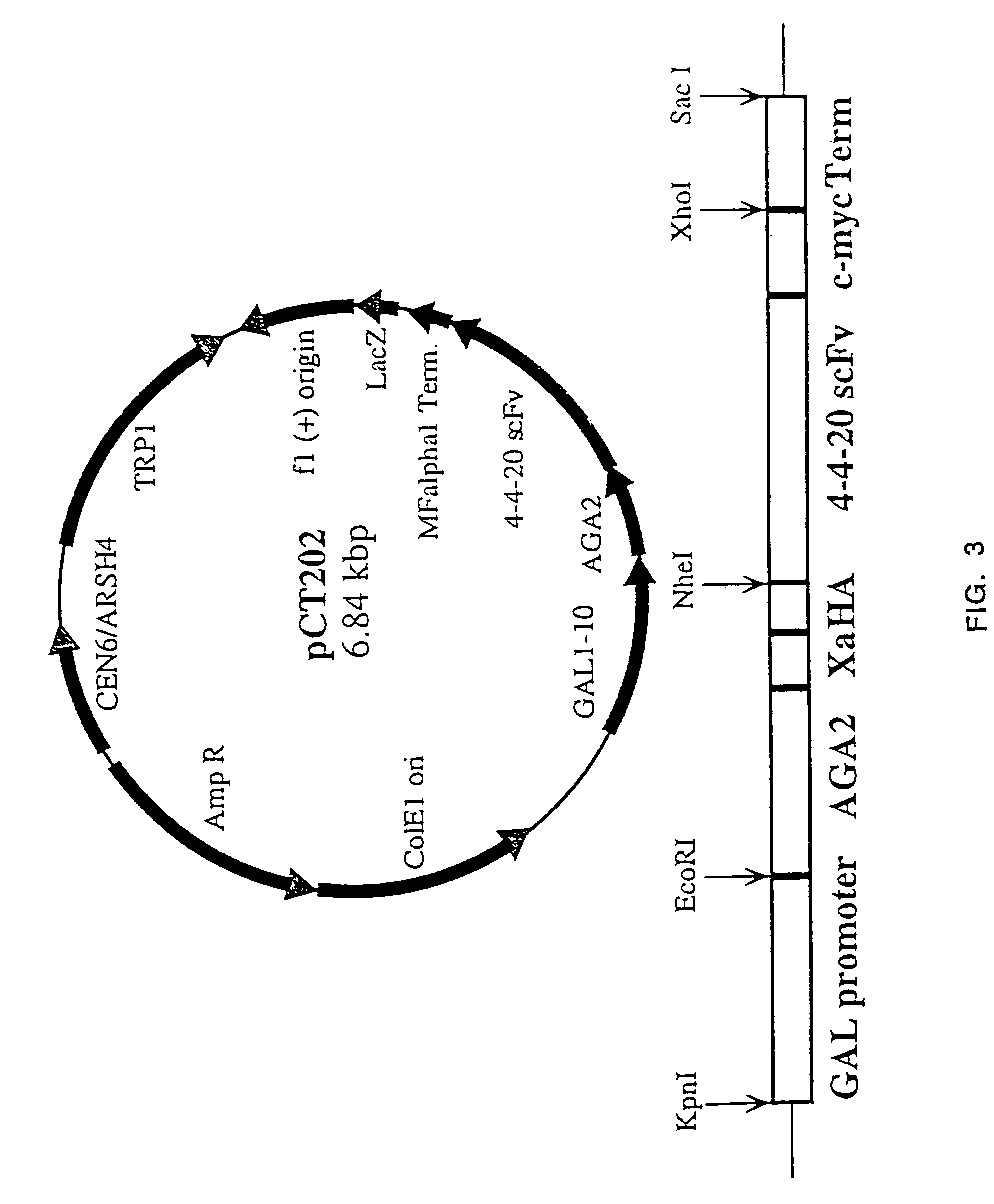Yeast cell surface display of proteins and uses thereof
- Summary
- Abstract
- Description
- Claims
- Application Information
AI Technical Summary
Benefits of technology
Problems solved by technology
Method used
Image
Examples
example 1
Media / Buffers
[0094]The following media / buffers were used herein:
E. Coli
[0095]LB media (1×): Bacto tryptone (Difco, Detroit, Mich.): 10.0 g; Bacto yeast extract (Difco): 5.0 g; NaCl:10.0 g. Make up to 1 L, autoclave. For plates, add 15 cg / L Agar and autoclave.
[0096]Stock: 25 mg / ml of sodium salt of ampicillin in water. Filter sterilize and store in aliquots of 4 mls at −20° C. Working [ ] 35-50 μg / ml; 4 ml of aliquot in 1 L->100 μg / ml; 2 ml of aliquot in 1 L->50 μg / ml. Add to autoclaved LB only after it has cooled to ˜55° C.
[0097]
SOC media100 mL
[0098]2% Bacto tryptone: 2.0 g; 0.5% Yeast Extract (Difco):0.5 g; 10 mM NaCl: 0.2 ml 5 M; 10 mM MgCl2: 1.0 ml 1 M; 10 mM MgSO4: 1.0 ml 1 M; 20 mM Dextrose: 0.36 g. Autoclave or filter sterilize.
[0099]
YEASTSynthetic Minimal + Casamino acids (SD-CAA)500mLDextrose (Glucose)10.00gYeast Nitrogen Base w / o Amino Acids (Difco)3.35gNa2HPO4•7H2O5.1gNaH2PO4•H2O4.28gCasamino Acids (Trp-, Ura-) (Difco)2.5g
[0100]Add dH2O to final volume. Filter s...
example 2
Protocol: Replica Plating
[0110]1. Choose a material suitable for colony lifts, making sure it is washed, dried and sterile.
[0111]2. Mark the bottom of each fresh replica plate with an arrow to line up the plate. Also mark the starting plate.
[0112]3. Take the top off the starting plate, turn it upside down and line up the arrow on the bottom with the mark on the colony lift material. Lay the plate down onto the surface of the material and gently put pressure on the entire plate. Make sure the plate doesn't move around after it has touched the material. Remove the plate and replace the lid. Portions of the colonies that transferred to the material can be seen.
[0113]4. Repeat this procedure with one of the fresh replica plates. Make sure the arrow lines up with the mark also to make an exact replica. Hold up to the light to see the tiny colonies that transferred.
[0114]5. Repeat the entire procedure for each replica plate to be made.
[0115]6. Incubate the replica plates at the appropriat...
example 3
Protocol: Electrotransformation of Yeast
[0116]The cell preparation procedure was as follows: Step 1. Inoculate 50 ml of YPD with an overnight culture to an OD of 0.1. Step 2. Grow cells at 30° C. with vigorous shaking to an OD600 of 1.3 to 1.5 (approximately 6 hours). Step 3. Harvest in cold rotor at 3500 rpm for 5 minutes at 4° C. Discard supernatant. Step 4. Thoroughly wash the cells by resuspending in 50 ml cold sterile water. Centrifuge as above and discard supernatant. Step 5. Repeat step 4 with 25 ml cold water. Step 6. Resuspend in 2 ml of ice-cold sterile 1 M sorbitol. Centrifuge as above and discard supernatant. Step 7. Resuspend in 50 ml ice-cold 1 M sorbitol. Final volume of cells is about 150 ml (enough for 3 transformations).
Electrotransformation:
[0117]1. Place 0.2 cm cuvettes and white slide chamber on ice.
[0118]2. In an eppendorf tube, add 50 ml of yeast suspension and gently mix in <5 ml (0.1 mg) of plasmid DNA in TE. Make sure to add DNA to yeast already in eppendor...
PUM
| Property | Measurement | Unit |
|---|---|---|
| Fraction | aaaaa | aaaaa |
| Fraction | aaaaa | aaaaa |
| Fraction | aaaaa | aaaaa |
Abstract
Description
Claims
Application Information
 Login to View More
Login to View More - R&D
- Intellectual Property
- Life Sciences
- Materials
- Tech Scout
- Unparalleled Data Quality
- Higher Quality Content
- 60% Fewer Hallucinations
Browse by: Latest US Patents, China's latest patents, Technical Efficacy Thesaurus, Application Domain, Technology Topic, Popular Technical Reports.
© 2025 PatSnap. All rights reserved.Legal|Privacy policy|Modern Slavery Act Transparency Statement|Sitemap|About US| Contact US: help@patsnap.com



